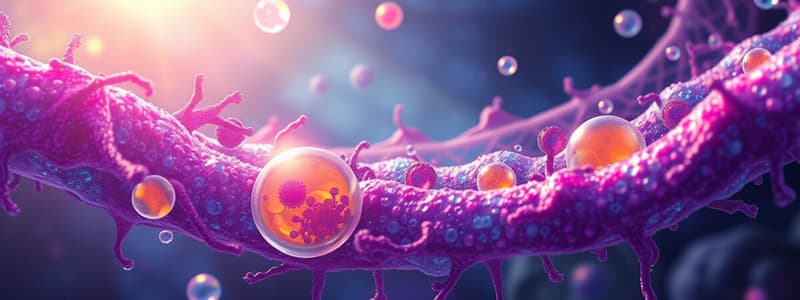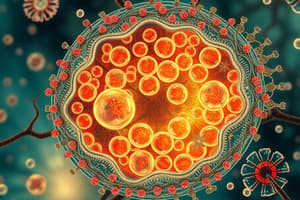Podcast
Questions and Answers
What does the term 'glycocalyx' specifically refer to?
What does the term 'glycocalyx' specifically refer to?
- A layer of proteins embedded in the cell membrane
- A network of DNA surrounding the nucleus
- A carbohydrate layer on the outer surface of the cell (correct)
- A lipid bilayer component of the cell membrane
How are worn-out organelles transferred to lysosomes?
How are worn-out organelles transferred to lysosomes?
- Through simple diffusion across the cell membrane
- By using single membrane vesicles formed in the cytoplasm
- By lysing the organelles directly at the membrane
- Via double-membrane structures known as autophagosomes (correct)
Which of the following statements about the glycocalyx is incorrect?
Which of the following statements about the glycocalyx is incorrect?
- It is negatively charged.
- It is primarily composed of carbohydrates.
- It is primarily made up of nucleic acids. (correct)
- It can form glycoproteins and glycolipids.
What is a significant characteristic of the glycocalyx?
What is a significant characteristic of the glycocalyx?
Which components typically combine to form the glycocalyx?
Which components typically combine to form the glycocalyx?
What role does the lysosome serve concerning worn-out organelles?
What role does the lysosome serve concerning worn-out organelles?
What is the charge of the glycocalyx and why is it significant?
What is the charge of the glycocalyx and why is it significant?
What is primarily contained within autophagosomes during the lysosomal transfer process?
What is primarily contained within autophagosomes during the lysosomal transfer process?
Which of the following is NOT a function of lysosomes?
Which of the following is NOT a function of lysosomes?
Which of these cell types does NOT exhibit ameboid locomotion?
Which of these cell types does NOT exhibit ameboid locomotion?
What ion most commonly stimulates exocytosis in cells?
What ion most commonly stimulates exocytosis in cells?
Lysosomes are primarily involved in the digestion of which of the following?
Lysosomes are primarily involved in the digestion of which of the following?
Which type of cell is characterized by its ability to move into damaged tissues?
Which type of cell is characterized by its ability to move into damaged tissues?
Which of the following statements about lysosomes is false?
Which of the following statements about lysosomes is false?
Which of these organisms have lysosomes that function similarly to human cells?
Which of these organisms have lysosomes that function similarly to human cells?
What activity is most closely associated with the role of lysosomes?
What activity is most closely associated with the role of lysosomes?
What role do lysosomes play in the regression of damaged cells?
What role do lysosomes play in the regression of damaged cells?
Which transport mechanism is described as not rate limited by intrinsic Vmax?
Which transport mechanism is described as not rate limited by intrinsic Vmax?
What mechanism allows for the opening or closing of channels through chemical binding?
What mechanism allows for the opening or closing of channels through chemical binding?
Which of the following best describes sodium-calcium counter transport?
Which of the following best describes sodium-calcium counter transport?
Which of the following is NOT a major function of the endoplasmic reticulum?
Which of the following is NOT a major function of the endoplasmic reticulum?
Which type of diffusion requires no metabolic energy?
Which type of diffusion requires no metabolic energy?
What is the primary role of mitochondria in a cell?
What is the primary role of mitochondria in a cell?
What primarily triggers lysosomal action in cellular regression?
What primarily triggers lysosomal action in cellular regression?
Which type of lipid is NOT commonly found in the cell membrane?
Which type of lipid is NOT commonly found in the cell membrane?
Which of the following statements about ligand-gated channels is true?
Which of the following statements about ligand-gated channels is true?
Which ion primarily facilitates the counter-transport of calcium in cellular membranes?
Which ion primarily facilitates the counter-transport of calcium in cellular membranes?
Which function is primarily associated with the Golgi apparatus?
Which function is primarily associated with the Golgi apparatus?
Which statement accurately describes autophagosomes?
Which statement accurately describes autophagosomes?
Which function is NOT performed by the endoplasmic reticulum?
Which function is NOT performed by the endoplasmic reticulum?
Which enzyme function is associated with the endoplasmic reticulum?
Which enzyme function is associated with the endoplasmic reticulum?
Which of the following is a correct description of the three main types of lipids in the cell membrane?
Which of the following is a correct description of the three main types of lipids in the cell membrane?
Study Notes
Cell Membrane and Glycocalyx
- Glycocalyx refers to a negatively charged carbohydrate layer found on the outer surface of cell membranes.
- Composed mainly of glycoproteins and glycolipids, the "glyco" components extend outward from the cell.
Autophagy and Lysosomes
- Worn-out organelles are transported to lysosomes by structures known as autophagosomes, which are formed in the cytosol.
- Lysosomes are responsible for digesting cellular structures, degraded materials, and foreign microbes.
Functions of the Endoplasmic Reticulum
- The endoplasmic reticulum is not involved in lysosome formation.
- Responsible for synthesizing lipids, proteins, and enzymes crucial for cellular function.
Mitochondria and ATP Production
- Mitochondria are the primary sites for adenosine triphosphate (ATP) production, which is vital for energy release within cells.
Cell Membrane Lipids
- The cell membrane consists of three primary types of lipids: phospholipids, sphingolipids, and cholesterol.
- Triglycerides are not a significant component of the cell membrane.
Lysosome Functionality
- Lysosomes digest damaged cellular structures, ingested food particles, and unwanted matter, including bacteria.
- Formed by the budding off from the Golgi apparatus.
Ameboid Locomotion
- Cells that exhibit ameboid locomotion include fibroblasts, tubular epithelial cells, and embryonic cells, with lysosomes being the exception.
Exocytosis and Calcium
- Calcium ions play a crucial role in stimulating exocytosis by entering the cell.
Regression of Damaged Cells
- Lysosomes contribute to the regression of damaged cells by facilitating degradation and recycling of cellular components.
Ligand Gating in Channel Proteins
- Ligand-gated channels are chemical-regulated; they open or close when specific substances bind to them.
Types of Diffusion
- Simple diffusion and facilitated diffusion are both passive processes, not using ATP, with facilitated diffusion being limited by carrier protein availability (Vmax).
- Primary active transport mechanisms, like carrier proteins, are distinct from these diffusion types.
Sodium-Calcium Counter Transport
- Counter-transport involves the movement of sodium ions and calcium ions across cell membranes.
- This transport mechanism is essential for regulating calcium levels in cells.
Studying That Suits You
Use AI to generate personalized quizzes and flashcards to suit your learning preferences.
Related Documents
Description
Test your knowledge on the structures and functions of cell membranes and organelles such as lysosomes and mitochondria. This quiz covers key concepts including the glycocalyx, autophagy, and the endoplasmic reticulum. Perfect for students studying cell biology.




